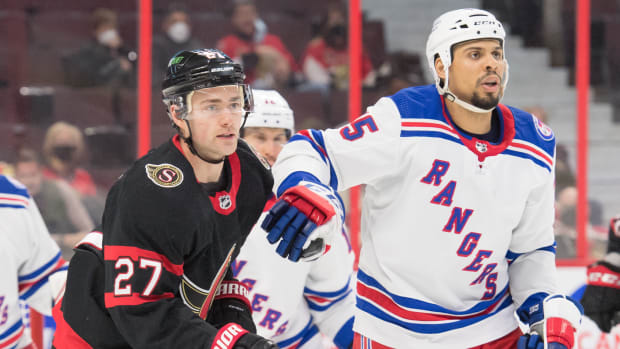Welcome, once again, to Screen Shots, a regular THN.com feature that takes a briefer look at a few disparate hockey topics. In this edition, we’re analyzing three NHL teams in different states of desperation thus far this season. As always, we’ll get down to business right away:
– The Minnesota Wild looked rather desperate this week in acquiring enforcer forward Ryan Reaves from the New York Rangers. It’s hard to imagine Wild GM Bill Guerin looking at his team’s 9-8-2 record this year and deciding that adding a fighter who has never scored more than nine goals in a single season is going to jump-start Minnesota’s largely ineffective offense? If Reaves really was a difference-maker, why did the Rangers give him up for only a fifth-round draft pick?
The Wild were on a two-game win streak heading into Friday’s afternoon tilt against Toronto, but before that, they’d lost five of seven games. They’re fortunate to be playing in a Central Division that has the awful Chicago Blackhawks and Arizona Coyotes settling into the bottom of the division, and although they’re technically in a three-way tie for the fourth spot, in five of their losses, they’ve scored two goals or fewer.
If it weren’t for strong play from No. 2 goalie Filip Gustavsson (playing in place of the injured starter Marc-Andre Fleury), the Wild would be even closer to the bottom of the Central than they are at the top. The Reaves trade feels like a desperate move to change the chemistry of the dressing room, and the salary-cap-strapped Wild need to turn things around quickly before Guerin makes a bigger, riskier deal.
– In Ottawa, the end feels near for Senators head coach D.J. Smith. Since their four-game win streak in mid-to-late October produced some hope that Ottawa could contend for the playoffs, the Sens have gone a gnarly 2-10-1, and they currently have the NHL’s second-worst points percentage (.342), with only Anaheim (.325) being worse.
When the Blackhawks and Coyotes are performing better, you know something has gone badly wrong. Given that the transitioning ownership group isn’t likely to fire GM Pierre Dorion, Smith probably will bear the brunt of the pressure, and Ottawa will turn to someone like veteran bench boss Alain Vigneault or up-and-comer Andrew Brunette.
The problem with the Sens is clear – their defense is terrible, and lately, their offense has shut down as well: in their current three-game losing skid, they’ve scored only a single goal in each game, and they were outscored 14-3 in that span.
They’re getting next-to-nothing on offense from their bottom-six forwards, putting all sorts of pressure on the top-six forwards to carry the load for them. Dorion still has more than $3.4 million in cap space, but this doesn’t look like a franchise that can be turned around by a single roster move. Coaching is a zero-sum profession, and Smith knows his job security is jeopardized to a greater degree with every Senators loss. Another few games of misery and Dorion will likely cashier him, although the GM recently said coaching isn’t the problem.
– Lastly, let’s shine a light on the current slide of the Edmonton Oilers. Edmonton fans and media were fairly happy with a five-game win streak at the end of October that gave the Oilers a 7-3-0 record, but since then, they’ve gone 3-7-0 and sit fifth in the weak Pacific Division.
The Oilers’ bottom-six forwards are a nightmare, particularly when it comes to generating offense: in 20 games, their bottom two forward lines have amassed only 11 points – 12 if you include injured forward Devin Shore. That is simply unacceptable, and the man responsible for it – GM Ken Holland – has to deal with the heat the franchise is feeling right now.
Holland is completely capped-out, and even if he did have a few million in space, there’s nobody on the trade block – Coyotes D-man Jakob Chychrun included – who could come in and make them into a responsible defensive unit. There’s a bleakness surrounding this team, which has two all-world players in Connor McDavid and Leon Draisaitl but can’t seem to figure out a way to surround them with above-average talent.
Holland has spent three years of the five-year contract he signed with Edmonton in May 2019 trying to construct a consistent winner, but at the moment, he doesn’t appear to have the answers Oilers supporters are demanding. Soon enough, those supporters are going to start demanding change at the GM level.



